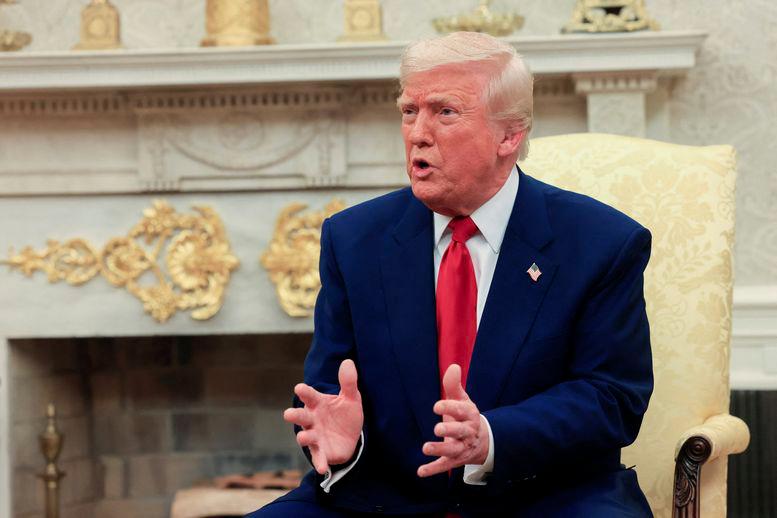WASHINGTON/BEIJING: The United States called China’s retaliation against its tariffs a “big mistake” on Tuesday, as a global trade war ignited by President Donald Trump’s sweeping levies showed few signs of abating, even as global markets steadied after days of carnage.
China refused to bow to what it called “blackmail” after Trump threatened to ratchet up tariffs on U.S. imports from the world’s No. 2 economy to more than 100% in response to China’s decision to match “reciprocal” duties Trump announced last week.
China's fast and hardline approach contrasted with more emollient moves by other Asian countries. The European Union is also still consulting with member states on how hard to punch back against Trump's tariffs without causing more harm to its consumers and exporters.
U.S. Treasury Secretary Scott Bessent blasted Beijing in an interview with CNBC. He stressed that any U.S. negotiations with other countries on tariffs were the result of them knocking on Washington's door and not due to global market turmoil.
“I think it was a big mistake, this Chinese escalation,“ he said. “Everything is on the table,“ Bessent said when asked whether the European Union needed to lower non-tariff barriers including value-added taxes.
China on Tuesday vowed to “fight to the end”.
“The U.S. side’s threat to escalate tariffs against China is a mistake on top of a mistake, once again exposing the American side’s blackmailing nature,“ China’s Commerce Ministry said.
European Commission President Ursula von der Leyen in a phone call with China's Premier Li Qiang called on Beijing to ensure a negotiated solution and stressed the need to support a fair trading system founded on a level playing field.
The two also discussed setting up a mechanism to track possible trade diversion caused by the tariffs, von der Leyen's office said, as the EU fears China will redirect cheap exports from the U.S. to Europe.
Chinese manufacturers of goods from tableware to flooring are warning about profits, and scrambling to plan new overseas plants as they reel from the tariff news. Citing rising external risks, Citi cut its 2025 China GDP growth forecast to 4.2% from 4.7%.
As the world’s two biggest economies traded blows, China’s Foreign Ministry criticised as “ignorant and impolite” comments made by Vice President JD Vance in a recent Fox News interview.
While defending Trump’s tariffs, Vance criticised the U.S. economic model as harming its own workers: “We borrow money from Chinese peasants to buy the things those Chinese peasants manufacture.”
'UNRECOGNISABLE' US
As financial market sentiment remained fragile, the head of the pan-European stock exchange operator Euronext said the United States was starting to resemble an emerging market.
“Fear exists all over,“ Stephane Boujnah told France Inter radio, saying the U.S. had become “unrecognisable”.
“There is a certain form of mourning, because the United States that we had known for the most part as a dominant nation resembled the values and institutions of Europe and now resembles more an emerging market.”
Emerging markets often use targeted tariffs to protect certain industries from foreign\ competition.
Stock markets found a firmer footing on Tuesday after a gut-wrenching few days for investors which prompted some business leaders, including those close to Trump, to urge the president to reverse course.
European shares bounced off 14-month lows after four straight sessions of heavy selling, while global oil prices steadied after falling to four-year lows.
U.S. stock index futures edged higher after suffering trillions of dollars in losses since last week.
Trump said the tariffs - a minimum of 10% for all U.S. imports, with targeted rates of up to 50% - would help the United States recapture an industrial base he says has withered over decades of trade liberalisation.
EUROPE EYES COUNTER-MEASURES
The European Commission, meanwhile, is mulling counter-tariffs of 25% on a range of U.S. goods including soybeans, nuts and sausages, though other potential items like bourbon whiskey were left off the list, a document seen by Reuters showed. Officials said they stood ready to negotiate a “zero for zero” deal with Trump’s administration and said all instruments were on the table to avoid a tariff war.
The 27-member bloc is struggling with tariffs on autos and metals already in place, and faces a 20% tariff on other products on Wednesday. Trump has also threatened to impose tariffs on EU alcoholic drinks.
European pharma companies, also fearful of the tariff fallout, warned von der Leyen in a meeting that Trump's tariffs would expedite the industry's shift away from Europe and towards the United States.
Facing some of the steepest U.S. duties, low-cost manufacturing hub Vietnam has requested a 45-day delay while Indonesia announced concessions for U.S. imports including reducing taxes on electronic goods and steel.









